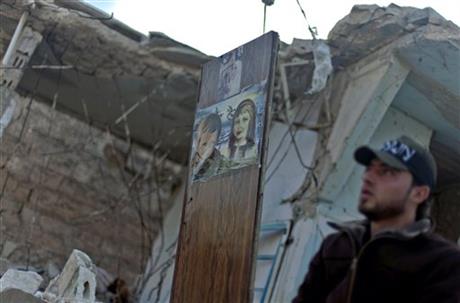
By BASSEM MROUE and LORI HINNANT
FILE – In this Friday, Nov. 16, 2012 file photo, A Free Syrian Army fighter stands next to a painting on a piece of wood left in a destroyed house in the town of Taftanaz, on the outskirts of Idlib, Syria. Syria’s uprising was not destined to be quick. Instead, the largely peaceful protest movement that spread across the nation slowly turned into an armed insurgency and eventually a full-blown civil war. More than 130,000 people have been killed, and more than 2 million more have fled the country. Nearly three years after the crisis began, Syria’s government and opposition are set to meet in Geneva this week for the first direct talks aimed at ending the conflict. (AP Photo/Khalil Hamra, File)
Ban Ki-moon
This Sept. 21, 2012, file photo shows United Nations Secretary General Ban Ki-moon attending a brief news conference at the United Nations. Ban Ki-moon says Iran has agreed to endorse the principles in the so-called “Geneva communique.” (AP Photo/Richard Drew, File)
Prev 1 of 2 Next
BEIRUT (AP) — Syria’s main Western-backed opposition group said Monday that Iran must commit publicly by 7 p.m. GMT to withdraw its “troops and militias” from Syria and abide by a 2012 transitional roadmap, or else the U.N. should withdraw its invitation for Tehran to take part in a peace conference.
The Syrian National Coalition said if those conditions are not met by the deadline, then it will not attend the so-called Geneva 2 conference that is scheduled to begin Wednesday. The U.N. issued a last-minute invitation late Sunday to Iran, a close ally of Syrian President Bashar Assad, prompting the Coalition to threaten to sit out the peace talks and throwing the entire Geneva conference into doubt.
The negotiations are intended to bring together for the first time representatives of President Bashar Assad’s government and members of the Western-backed opposition that is trying to overthrow him. The conference aims to broker a political resolution to a conflict that has killed more than 130,000 people and touched off the worst humanitarian crisis in decades.
In its statement, the Coalition called on Iran to make a “clear public commitment” to withdraw all of its troops and militias from Syria, commit to all the terms of a 2012 roadmap for Syria agreed to by world powers that includes a transitional government with full executive powers.
“In case of failure to obtain the pledge, we ask Secretary-General Ban Ki-Moon to withdraw the invitation to Iran. Otherwise, the Syrian Coalition will not be able to attend the Geneva 2 conference,” the Coalition said.
Iran has supplied Assad’s government with advisers, money and materiel since the 2011 Syrian uprising began. The Islamic Republic’s allies, most notably the Lebanese Shiite militant Hezbollah group, have also gone to Syria to help bolster Assad’s forces.
The U.S., which along with its European allies is a key supporter of the opposition umbrella group, threw its weight behind the Coalition’s strong stance against Iran’s participation.
In Washington, senior U.S. officials said Iran has still not met the criteria to participate in an upcoming international conference on Syria and its invitation to attend should be withdrawn unless it fully and publicly endorses the aims of the meeting.
Speaking to reporters on Monday, the officials said public statements from Iran about the conference fall “well short” of what is required for Tehran’s participation. They said that the United Nations must rescind the invitation unless that changes.
The officials spoke on condition of anonymity because they were not authorized to discuss the matter by name. But, their comments were similar to a statement the State Department issued on Sunday.
The officials spoke after Iran’s foreign ministry said earlier Monday that it would attend without preconditions.
In New York, Russia’s U.N. ambassador Vitaly Churkin said “of course” both the U.S. and Russia were consulted about the Iran invitation, and he said that if the Syrian opposition boycotts the talks, “that would be a big mistake.”
The invitation to Tehran from Secretary-General Ban Ki-Moon came after the U.N. chief said he had received assurances from Iran that it accepted the premise of the talks — to establish a transitional government for Syria, which has been led by the Assad dynasty since 1970.
Diplomats and political leaders acknowledge that a quick end is unlikely for a conflict that has killed more than 130,000 people and touched off the worst humanitarian crisis in decades. The battle lines have been largely frozen since early 2013, and the Syrian National Coalition has little sway or respect within Syria’s rebellion.
____
AP writer Cara Anna in New York contributed to this report.



